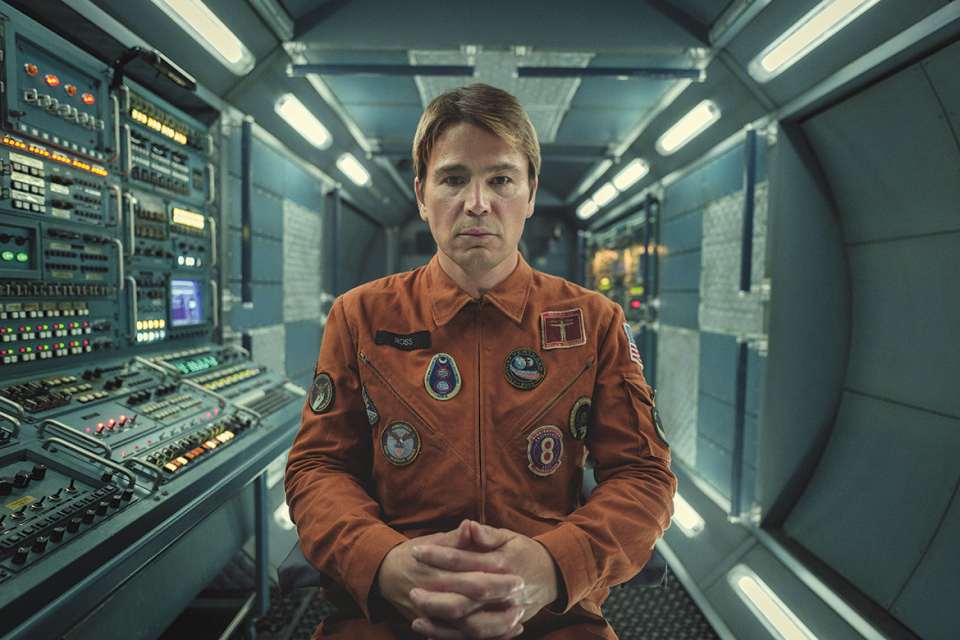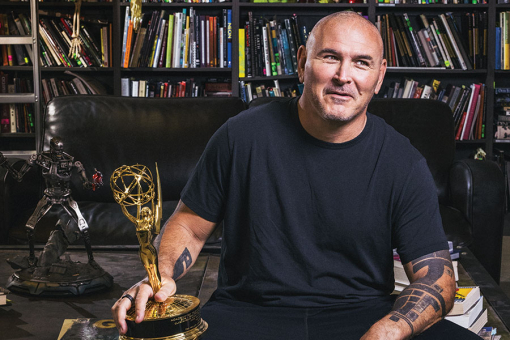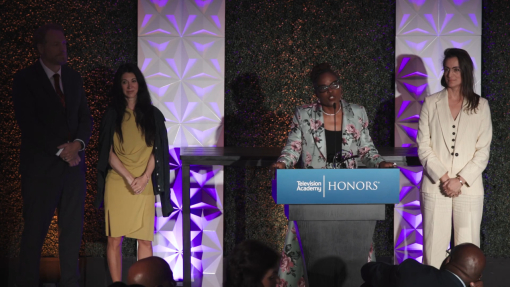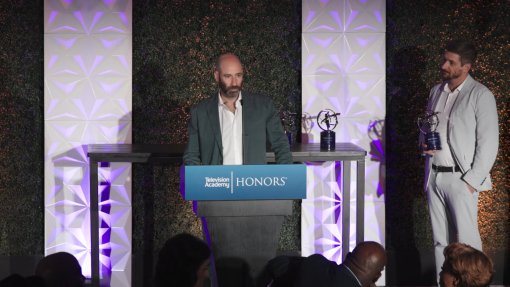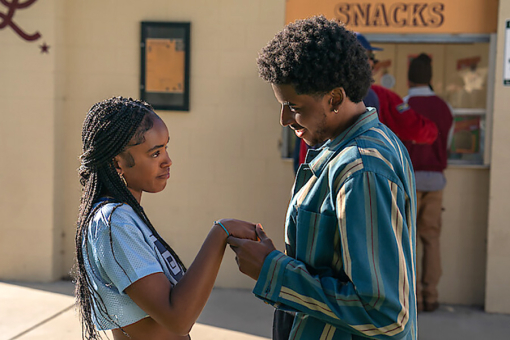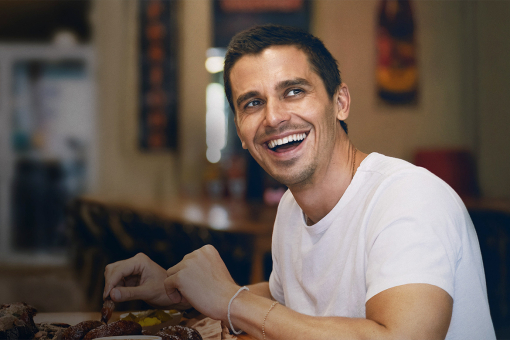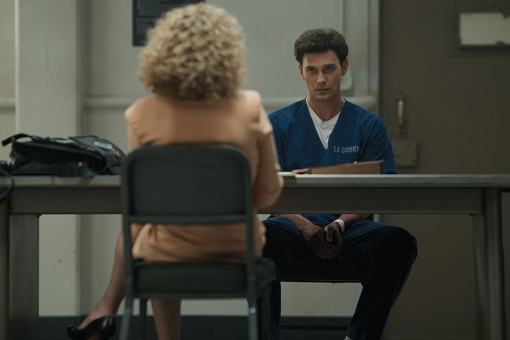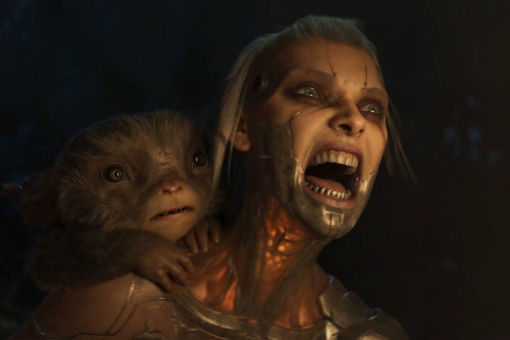In his Netflix anthology Black Mirror, creator Charlie Brooker likes to rely on technological MacGuffins — high-concept pieces about the ways tech-nology twists how we function. A typical Black Mirror route for a story about astronauts might involve holograms, view-screens or other scientific advances to create a warped dysto-pian future, but Brooker decided to go another way with the sixth season's alternative-history episode, "Beyond the Sea."
It's unusual for a few reasons: It takes place in 1969, making it the earliest in the Black Mirror chronological timeline, but also because of its nuanced focus on human relationships. The cast and crew of "Beyond the Sea" spoke with emmy contributor Jennifer Vineyard about the episode that broke the Black Mirror mold.
TWO BLOKES IN SPACE
"Beyond the Sea" centers around two astronauts who — away from Earth on an extended mission — use a technology that lets their consciousness animate robot replicas of their bodies back home.
Charlie Brooker (creator, executive producer): I was trying to shake up what Black Mirror is, and I'd been chewing on this idea for a while. At first, the story was going to comment on how we have to cooperate if we're going to survive climate change. An act of God, like a forest fire, would wipe out a character's family, meting out this terrible, unwarranted punishment. But it felt more relevant to the cyclical nature of violence to make it an act that humans were committing instead.
John Crowley (director): I said to Charlie, "This is like a Greek tragedy." It had a drive towards a catastrophic, nihilistic ending that felt Greek, the way human beings and their emotions destroy each other. The pettiness of men, especially.
Aaron Paul (actor, Cliff Stanfield): It's a futuristic story placed in a period piece.
Brooker: I was listening to music from the late '60s, and I thought, "Why can't I set this in 1969?" Setting it in the past made a strange sense.
Josh Hartnett (actor, David Ross): My character [initially] looks at this as a glass-half-full situation. He can be with his family, if not in body, then in mind, while his body can continue a space mission in isolation, floating through emptiness, for potentially years.
Crowley: Whoever created this space program made it convenient for marriages to continue while two men send their actual bodies out to space. It's not just about the replicas, beaming consciousness up and down.
Brooker: They are literally hundreds of thousands of light years from home, and yet also present. And there's an emotional distance that carries through for Cliff, even when he's physically there on the planet. There's a disconnect there.
Crowley: The thing that was less teased out in the first draft was the nature of it as a metaphor about marriage. In this very queasy way, I was curious about the set-up: How does that work? Are [the robots] just glorified house-help? What happens in the marriage bed?
Brooker: So you'll notice near the start, David is enjoying an intimate moment with his wife, Jessica (Auden Thornton). How do I put this? He's pleasing her.
Jessica Rhoades (executive producer): Quickly you understand there's a gap in one marriage and not in the other. David knows his wife has to be happy for this to work. Cliff has less prioritized his relationship — there's a robotic nature to it. But talk about awkward conversations! It's funny being the only woman on a call, having conversations about how we as an audience are going to perceive a male character who prioritizes his wife's pleasure, which helps subvert the turn in the end.
Kate Mara (actress, Lana Stanfield): David comes off as one way, but obviously by the end, you discover David is really not as thoughtful as he seems.
Crowley: I felt like this loneliness and intimacy was the key to unlocking the whole story and tipping it away from being about two blokes in space. It gave a whole different level of emotional complexity, and an interesting purchase on the state of male-female relationships.
THE HEART OF DARKNESS
While David and Cliff are in space, cult members who oppose artificial humans break into David's home, murder his family and destroy his robot replica.
Brooker: We've got this cult, following a warped ideology, showing up and attacking Josh Hartnett's character, David, who's revealed to be a mechanical man.
Crowley: We first shot David's California home and home-invasion sequence in Spain.
Hartnett: We had a couple of days to ease into the scene where my family is killed in front of me.
Crowley: In the script, Charlie had suggested that we don't see the murders. We would see something on David's face. I felt it was interesting to get close to the heart of darkness without seeing it. It's all the more horrendous for what's implied and what's behind the camera. The idea of the circular twisting shot came about, which also happens at the end as a callback.
Stuart Bentley (cinematographer): The feeling of a moving camera, having that sense of weightlessness when we were in space, tied in nicely with the rotation that we do when they have these horrific moments.
A SECOND CHANCE
To encourage David's recovery from his tragic loss, Cliff and Lana allow him to use Cliff's replica for a time. He starts painting in Cliff and Lana's barn.
Crowley: If you drop a different personality into the same replicant body, into the same marriage, that's almost like a drop of ink going into water. It's not going to be easily taken out. That felt like a rather devilish thought experiment.
Hartnett: David was exploring a second chance in Cliff's replica. He thought he was falling in love with his work colleague's wife, but the twist is, he's in his work colleague's body.
Crowley: It's a very subtle piece of acting. I was keen that Aaron Paul's version of Josh Hartnett's character wouldn't be an impersonation. Once he got past the slight awkwardness of it not being his body, he was able to open up an aspect of David within Cliff's body that rang true.
Paul: It was a beautiful challenge. I wanted to spend as much time with Josh as possible and witness how he was going to portray this particular guy — his mannerisms with his hands, how he draws, how he paints. I wanted to match that.
Crowley: There is an emotional availability in Cliff/David that is different than Cliff. Lana is looking at Cliff, who is looking at her with David's very engaged and at times desiring eyes. He's very present in all respects, seeing the world anew again.
Mara: When Cliff/David starts spending time with Lana, she really gets to feel seen. I think that's when it starts to escalate the sadness. It's just magnified when he leaves.
Paul: I loved playing Cliff, but I wanted to slap him, because this woman is in love with him and just desperate for attention. Cliff was so stuck in his ways. David was present. He wanted a partner. And she just longs for that. It's obviously very confusing to her.
Crowley: Lana tells Cliff about the emotional intimacy she shares with Cliff/David. Suddenly their fight is crystallizing and bringing back to life something that had been dormant in that relationship.
Paul: It felt like the relationship was coming back. I wish Cliff had just stopped and kissed her before he left — had just done something.
Brooker: The tragedy is, just as Cliff learns to reconnect with his wife, he also chooses to rub David's face in it. Cliff chooses to humiliate David. And Cliff is discussing his wife as though she's a possession. It's quite a blow.
'THE TINIEST BUMP'
During production of "Beyond the Sea," the team learned that Kate Mara was pregnant.
Rhoades: We were so happy for her. Then we thought, "Can we work that into the story?" [They ultimately chose not to.] So Kate wore the thickest wool coats in the middle of a heatwave, poor thing.
Mara: I think it was the hottest it had been in 40 years or something.
Bentley: We were shooting in the summer. The hope was that the California home scenes, shot in Spain, would have golden sunlight. And then we would contrast that with Cliff's house in New England, which would have a more somber atmosphere. And then of course what happened was, when we went to Spain, it rained for three days. When we got to the U.K., which was a cheat for New England, we had the most insane heatwave.
Crowley: By the last day of shooting, Kate was visibly pregnant.
Rhoades: We did a little VFX to cover the tiniest bump.
Mara: Aaron would always say, "There are three of us in this scene." We could only get so close physically, because my stomach was in the way.
HUMANITY LOST
In response to losing access to a surrogate body, David surreptitiously beams down to Earth one last time — to murder Cliff's family. After discovering the murder, Cliff returns to the ship, where David calmly invites him to take a seat.
Brooker: I was reading tragic, inexplicable stories — the kind you find every so often about someone wiping out their entire family. It's such an aggressive, nihilistic, self-centered, unfathomable act. It is a very masculine rage.
Rhoades: When I was reading the script, you think you know what's going to happen. It's such a Charlie Brooker worst-case scenario ending. It's just the worst human torture.
Hartnett: The more forward-thinking, progressive character is the one who ends up losing it entirely. David is the target of this heinous crime that sets the whole plot in motion, and I think David was devastated to a point that he probably wasn't himself at all anymore. He finds no other way out than to put his mate in the same predicament.
Brooker: What David does is an echo of what he feels was done to him. It said more about helping unlock the trauma that he's experiencing, and how he expresses his outrage. It's not to excuse what he does, because what he does is he lashes out and he punishes.
Hartnett: When I was discussing it with them, there were no good guys, no bad guys. Two people are locked together; one person has been pushed beyond his limit, and there is no escape. What would they do to get the other person's attention? What would they do to find a connection? It's a two-man vessel. If they don't work together, or if one of them goes off the deep end, it's not going to work.
Udo Kramer (production designer): The ship is like a prison. I thought there shouldn't be corners where you can go off and hide somewhere. It's a bit like a tiger's cage, where people can circle each other, but you can't separate. You have to face your problems every day.
Brooker: I know I'm ready to write an episode if I know what the final image is going to be. That was in there from the very beginning: a chilling, wordless final image that becomes your North Star — David shoving out a chair for Cliff to sit down.
Rhoades: We had so many conversations about how the chair would be kicked out — what the posturing is, what the offer was.
Hartnett: An idea we had was, "Can we make this seem as though it's the most natural thing?" I really like the moment we came to, which is just an invitation.
Kramer: We discussed, "Should the stool be literally fixed with the table, as it might have been in a weightless space environment?" But you couldn't easily kick out the stool. So we changed it to more classic chairs.
Brooker: Quite often in Black Mirror, stories end up with a trap door opening beneath a character. This is one of the biggest and deepest trap doors we've had. All humanity is lost there. It felt like, "Join me in hell." It's subverting what should be a friendly, simple gesture — come, join me, take a seat — and transforming it into something unbelievably cold. It sent shivers down my spine.
Hartnett: I wasn't thinking, "Join me in hell," but that sounds good. I was thinking, "We've got a long way to go. Now you understand what I'm going through. Join me, or don't. It's your decision now." It's horrifying. It's as dark as it gets. Knowing Charlie's work, I wouldn't expect anything less.
The full version of this article originally appeared in emmy magazine, issue #7, 2024, under the title "Through a Glass Darkly."



